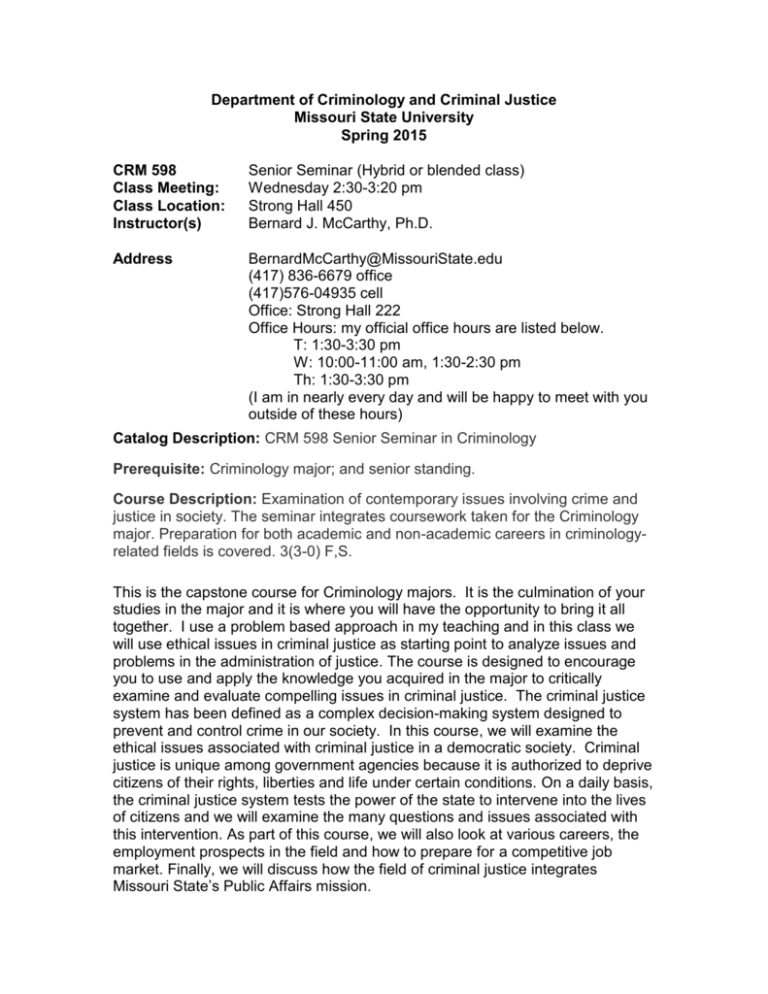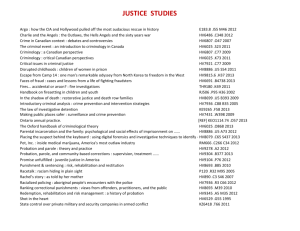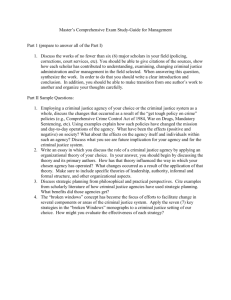CCJ 4486 Criminal Justice Ethics
advertisement

Department of Criminology and Criminal Justice Missouri State University Spring 2015 CRM 598 Class Meeting: Class Location: Instructor(s) Senior Seminar (Hybrid or blended class) Wednesday 2:30-3:20 pm Strong Hall 450 Bernard J. McCarthy, Ph.D. Address BernardMcCarthy@MissouriState.edu (417) 836-6679 office (417)576-04935 cell Office: Strong Hall 222 Office Hours: my official office hours are listed below. T: 1:30-3:30 pm W: 10:00-11:00 am, 1:30-2:30 pm Th: 1:30-3:30 pm (I am in nearly every day and will be happy to meet with you outside of these hours) Catalog Description: CRM 598 Senior Seminar in Criminology Prerequisite: Criminology major; and senior standing. Course Description: Examination of contemporary issues involving crime and justice in society. The seminar integrates coursework taken for the Criminology major. Preparation for both academic and non-academic careers in criminologyrelated fields is covered. 3(3-0) F,S. This is the capstone course for Criminology majors. It is the culmination of your studies in the major and it is where you will have the opportunity to bring it all together. I use a problem based approach in my teaching and in this class we will use ethical issues in criminal justice as starting point to analyze issues and problems in the administration of justice. The course is designed to encourage you to use and apply the knowledge you acquired in the major to critically examine and evaluate compelling issues in criminal justice. The criminal justice system has been defined as a complex decision-making system designed to prevent and control crime in our society. In this course, we will examine the ethical issues associated with criminal justice in a democratic society. Criminal justice is unique among government agencies because it is authorized to deprive citizens of their rights, liberties and life under certain conditions. On a daily basis, the criminal justice system tests the power of the state to intervene into the lives of citizens and we will examine the many questions and issues associated with this intervention. As part of this course, we will also look at various careers, the employment prospects in the field and how to prepare for a competitive job market. Finally, we will discuss how the field of criminal justice integrates Missouri State’s Public Affairs mission. Course Goals: Students will be provided the opportunity to apply what they have learned in the major to real world problems and issues facing the field of crime and justice. Specific course objectives include: Reviewing and reassessing foundation issues (e.g., justice, discretion, etc) and problems in criminal justice. Identifying and critically reviewing continuing and emerging issues gun violence, legalization of marijuana and problems in the administration of justice (conviction of the innocent). Examining the moral foundations of criminal justice and identifying how they express themselves in the operational realities of criminal justice agencies and in decision-making. I identifying key leadership issues in the field. Identifying and reviewing solutions to perplexing ethical issues in criminal justice. Examining career tracks and identifying the most commonly experienced ethical challenges within the criminal justice system, as well as reviewing the strategies to deal with them. Providing students with a range of reasoning and problem solving skills necessary to assess and respond to ethical dilemmas from both an individual and organizational perspectives. Finally, the course will serve as a capstone course for majors by integrating and critically analyzing crime and justice issues. Text Justice, Crime &Ethics (8th) ed. (Braswell, McCarthy and McCarthy) Note: Estimated royalties from the sale of this book at MSU will be donated to the Missouri State Foundation for student scholarships. Important Class Dates: January 12 January 19 February 16 March 9-15 April 2-5 May 7 May 9-15 Classes Begin Martin Luther King’s Birthday Holiday (no classes) President’s Day Holiday Spring Break Spring Holiday Last day of Class: Final Exams Special Note Senior Exit Exam Required Student Assessment: 1. Class Participation 60% 2. 1 Exam: Final reflection paper 10% 3. Policy Analysis Paper 30% Policy on absences and makeups: No makeups will be permitted for anyone missing a scheduled assignment or test unless prior permission is granted. Breakdown on Assessment 1. Class Participation: (60 %) Attendance and Completion of web assignments. Article review and presentation 2 pages Career Planning o Vita 1-2 pages o Career description and outlook o Finding a job in your selected field 2. 1 Final Exam/Reflection paper (based on readings, class assignments and discussions). 3. Research/Policy Analysis Paper (10pp) Outline for Paper: Introduction: Identify a justice related news article occurring in 2014 that interests you. Identify the underlying criminal justice issue (policy issues) and why you picked the topic. Identify and describe the depth and breadth of the issue using library resources (just don’t google). Description of agency or organization most involved with the topic Describe role of the agency in the criminal justice system and identify the powers/authority of the agency. Identify and describe discretionary authority of the agency Describe the problem/issue you are investigating (Problem Statement) What are the primary causes of the problem/issue? Also briefly describe the history of the issue. What solutions or options are available? What option or solution is the preferred choice and why? Ethics Issue: Identify the ethical issues associated with the problem. What guidance is available to assist with making ethical decisions? Codes of Conduct? Based upon your review, what is your assessment that this issue can be resolved? Explain your answer. Prior to the submission of the paper students should schedule and appointment and submit a draft to the writing center on campus for review. This should be accomplished by April 15, 2013. Your final draft will be submitted to me through the TurnItIn portal on blackboard. Note: All students enrolled in the Senior Seminar must take the Criminal Justice/Criminology Exit Exam. The University’s accrediting agency (The Higher Learning Commission) requires it. This exam will be graded pass/ fail. However you will not receive credit for senior seminar without completing the test. This exam is normally given during the final exam period. Other Issues: The use by students of cell phones, Ipads, laptops, pagers, or similar communication devices including musical devices or radios during scheduled classes is not permitted unless otherwise instructed. Students who repeatedly arrive late to class or leave early will have their class attendance grade penalized. I intend to encourage class discussion on controversial issues during this class, such as gun control vs gun rights and the death penalty. You are expected to conduct yourself in a civil and professional manner. Statement of nondiscrimination: Missouri State University is an equal opportunity/affirmative action institution, and maintains a grievance procedure available to any person who believes he or she has been discriminated against. At all times, it is your right to address inquiries or concerns about possible discrimination to the Office for Equity and Diversity, Siceluff Hall 296, (417) 836-4252. Other types of concerns (i.e., concerns of an academic nature) should be discussed directly with your instructor and can also be brought to the attention of your instructor’s Department Head. Statement on Disability Accommodations: To request academic accommodations for a disability, contact the Director of Disability Services, Plaster Student Union, Suite 405, (417) 836-4192 or (417) 8366792 (TTY), http://www.missouristate.edu/disability. Students are required to provide documentation of disability to Disability Services prior to receiving accommodations. Disability Services refers some types of accommodation requests to the Learning Diagnostic Clinic, which also provides diagnostic testing for learning and psychological disabilities. For information about testing, contact the Director of the Learning Diagnostic Clinic, (417) 836-4787, http://psychology.missouristate.edu/ldc. Academic dishonesty policy: Missouri State University is a community of scholars committed to developing educated persons who accept the responsibility to practice personal and academic integrity. You are responsible for knowing and following the university’s student honor code, Student Academic Integrity Policies and Procedures, available at http://www.missouristate.edu/provost/3935.htm and also available at the Reserves Desk in Meyer Library. Students who violate standards of academic honesty will fail the course. Emergency Management Issues: Students should familiarize themselves with the emergency management policies of the university. You should know the evacuation procedures of each of the buildings you use on campus as well as emergency response protocols. I strongly suggest you sign up for the emergency notification tools the university use. If you have any questions in this matter please let me know. Finally, the instructor reserves the right to modify this syllabus based upon changing conditions






